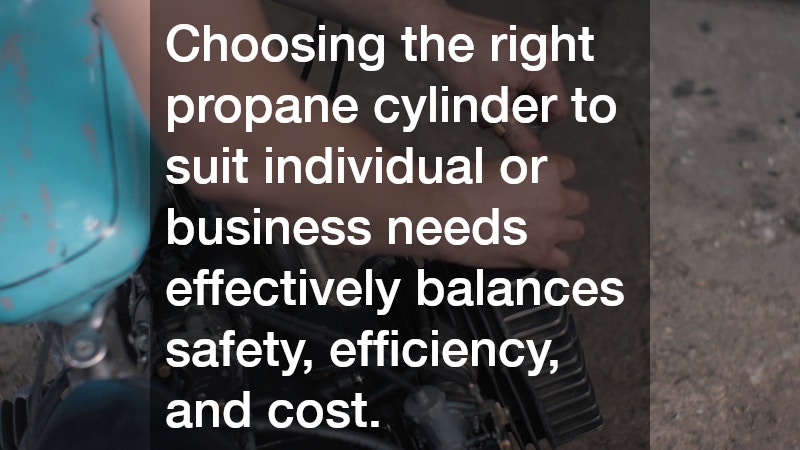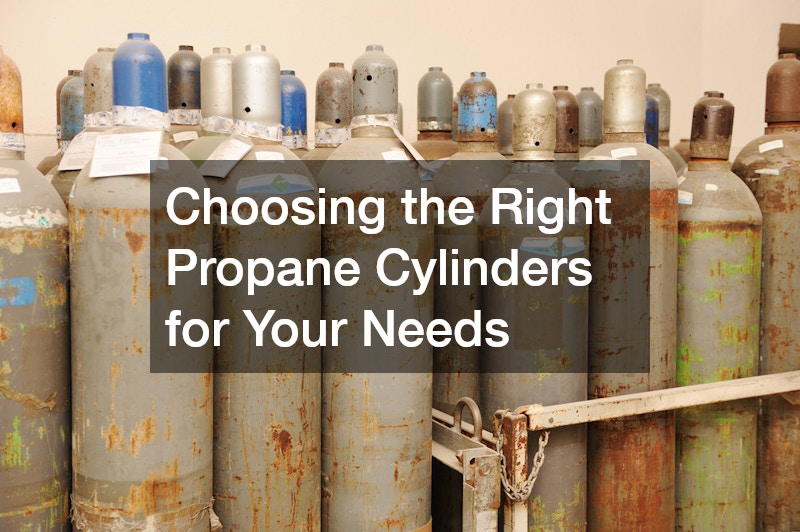Choosing the correct propane cylinder is crucial for maximizing efficiency, ensuring safety, and minimizing costs. Each requirement, whether residential, commercial, or recreational, comes with specific demands, and identifying these needs is the first step in making an informed decision. This article will guide you through the various aspects of selecting an appropriate propane cylinder for your unique situation.
What sizes of propane cylinders are available?
Commonly Available Sizes
The most common propane cylinder sizes are the 20-pound, 30-pound, and 100-pound models widely used across different scenarios. The ubiquitous 20-pound tank is typically employed for residential barbecues and small home appliances, offering versatility and ease of use.
Meanwhile, the 100-pound cylinder is more suitable for larger home heating systems or commercial applications.
These cylinders are readily available at most hardware stores and propane suppliers, making them a convenient choice for many users. The standard 20-pound size, weighing approximately 37 pounds when full, can hold about 4.7 gallons of propane. This is often sufficient for casual grilling sessions or moderate usage needs.
For those requiring more capacity, the 100-pound cylinder holds up to 24 gallons of propane, making it ideal for sustained use over time. These larger tanks are heavier and might require specialized handling equipment. Nonetheless, they provide a dependable supply for more demanding environments, such as commercial kitchens or seasonal heating.
Specialized Cylinder Sizes
Specialized propane cylinder sizes cater to niche applications that demand specific capacities and formats. One such example is the 33-pound cylinder, typically used in forklifts for light-duty industrial or warehouse environments. These cylinders are shaped differently to accommodate unique requirements while still providing optimal performance.
Another specialized variant is the 420-pound tank, commonly used for whole-house heating or large commercial use. These units can store up to 100 gallons of propane, significantly reducing the frequency of refills. However, due to their size, they require stable, stationary placement and are generally installed with professional help.
The presence of a variety of specialized cylinder sizes ensures that users can find a perfect match for their specific needs, regardless of industry or usage scenario. These less common configurations are essential for ensuring adequate supply and safety in unique settings, proving that there is a propane cylinder suited for every possible requirement.
How to Calculate the Appropriate Size for Your Needs
Determining the appropriate propane cylinder size involves calculating usage requirements and understanding your specific energy needs. Begin by estimating the total BTU (British Thermal Unit) consumption of all appliances or equipment that the cylinder will serve. This can be done by summing the BTU ratings of each individual appliance to find the total demand.
Once you understand your BTU requirements, calculate how much propane you’ll need by knowing that one gallon of propane contains approximately 91,500 BTUs. By dividing your total BTU needs by this figure, you can establish how many gallons are necessary for your intended usage period. This process allows you to identify whether a smaller residential tank is adequate or if a larger commercial option is required.
Often, it’s wise to choose a slightly larger cylinder than calculated to account for unforeseen demand increases or higher than expected usage. This ensures continuity in operations and prevents unexpected depletion, allowing both residential and commercial users to maintain steady propane access without disruption. Proper preparation makes all the difference in achieving efficiency and safety.
How do you choose a propane cylinder based on usage?
Residential Usage
For residential use, propane cylinders are typically chosen based on appliance requirements and family size. A 20-pound cylinder suits occasional BBQ use and lighter equipment such as patio heaters, providing a simple user experience with easy portability. For homes using propane for water heating or cooking, larger tanks offer longer-lasting service and less frequent refilling.
Given the average household’s moderate propane needs, residential users generally find the combination of small and medium-sized cylinders most economical. This setup can be efficiently managed through local propane refill stations or delivery services, ensuring a constant supply. Moreover, homeowners may opt for automatic delivery schedules offered by many propane suppliers to avoid interruptions.
Safety remains a key consideration in residential settings, with compliance to regulations and proper storage methods being critical. By selecting the correct size for your household, you reduce both the frequency of handling and the associated risks, maintaining a comfortable and secure living environment. Ultimately, properly selected propane cylinders enrich daily life with reliable energy access.
Industrial and Commercial Usage
In industrial and commercial environments, propane cylinders are often selected based on the scale of operation and specific equipment requirements. For instance, forklifts generally use 33-pound cylinders available in liquid or vapor configurations to power engines and maintain efficiency in warehouse settings. Similarly, culinary establishments rely on larger cylinders to fuel commercial kitchen equipment robustly.
Given the often demanding nature of commercial operations, unit downtime due to propane shortages can have substantial financial repercussions. As such, organizations typically prefer larger tanks, such as 100- or 420-pound options, to ensure continuous service. These choices enable professionals to focus on productivity, unencumbered by energy supply concerns.
In commercial contexts, stringent adherence to safety standards and regulations is paramount, necessitating careful consideration in choosing cylinder sizes and storage. Reliable providers often assist businesses in selecting appropriately sized cylinders, considering demand forecasts and regulatory compliance. By choosing wisely, commercial entities secure an uninterrupted and safe energy supply.
Choosing the right propane cylinder to suit individual or business needs effectively balances safety, efficiency, and cost. Understanding the various sizes, applications, and safety considerations ensures users select appropriate cylinders to accommodate their specific demands. By thoroughly examining needs and adhering to best practices, anyone can enjoy reliable, safe, and efficient propane energy.




